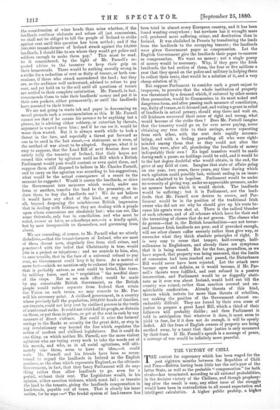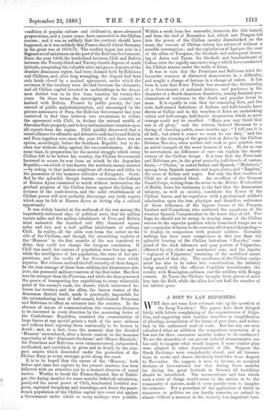THE VICTORY OF CHILI. T HE contest for supremacy which has
been waged for the past eighteen months between the Republics of Chili and Peru—Bolivia having been little but the cat's-paw of the latter State, as well as the probable " compensation" for both rivals—hai terminated, according to all rational probabilities, in the decisive victory of the Chilians, and though prophesy- ing after the result is easy, any other issue of the struggle would have been in contradiction to all sound expectation and intelligent calculation. A higher public probity, a higher condition of popular culture and civilisation, more advanced preparations, and a juster cause, have succeeded in the Chilian success ; and it was as unlikely that the contrary should have happened, as it was unlikely that France should defeat Germany in the great war of 1870-71. The conflict began last year in a flagrant act of unfairness on the part of the Bolivian Government. Since the year 1838, the borderland between Chili and Bolivia between the Twenty-third and Twenty-fourth degrees of south latitude, comprising the valuable nitre and guano deposits of the desolate Atacaman region, had been claimed both by Bolivians and Chilians, and, after long wrangling, the dispute had been only lately closed by a mutual agreement, under which the revenues of the territory were divided between the claimants, and all Chilian capital invested in undertakings in the Ataca- man district was to be free from taxation for twenty-five years. On these terms, the sovereignty of the country re- mained with Bolivia. Pressed by public penury, the just reward of public maladministration, and encouraged by the private assurances of Peru, the Bolivian Government last year contrived to find time between two revolutions to violate the agreement with Chili, to declare the natural wealth of Atacama State property, and to levy indiscriminate taxation upon all exports from the region. Chili quickly discovered that a secret alliance for offensive and defensive ends had bound Bolivia and Peru together ever since the year 1872, and there was no option, accordingly, before the Southern Republic but to de- clare war without delay against the two confederates. At the same time, in preparation for the mortal struggle which every Chilian felt to be before his country, the Chilian Government hastened to secure its rear from an attack by the Argentine Republic—on which it was known the northern enemy counted —by ceding to that jealous neighbour all claims and titles to the possession of the immense solitudes of Patagonia. Grati- fied by the splendid, though barren, concession, the Cabinet of Buenos Ayres consented to watch without intervention the gradual progress of the Chilian forces against the failing re- sistance of the confederates, and the solid establishment of Chilian power will now probably discourage any tardy regrets which may be felt at Buenos Ayres at letting slip a critical opportunity.
It was widely fancied at the outbreak of the war among the imperfectly-informed class of political seers, that the million square miles and five million inhabitants of Peru and Bolivia must outmatch the hundred and fifty thousand square miles and two and a half million inhabitants of solitary Chili. In reality, all the odds were from the outset on the side of the Chilians, and though the astonishing exploits of the "Huascar ' in the first months of the war contrived to delay, they could not change the foregone conclusion. If Chili was small, her centres of population were less far apart ; while the intelligence of her population, the state of her pre- parations, and the credit of her Government were vastly superior. Her citizens realised the full intensity of their danger. In the iron courage of those born soldiers, her Araucanian sub- jects, she possessed military reserves of the first order. Her fleet was far stronger than the Peruvian, and while she thus possessed the power of transporting her expeditions to every vulnerable point of the enemy's coast, the deserts which intervened be- tween her territory and the allies, the barren wastes of the Atacaman district itself, made it practically impossible for the outnumbering host of half-armed, half-trained Peruvians and Bolivians to effect an entrance into the country. In the absence of means of communication, the enormous distances to be traversed in every direction by the mustering levies of the Confederate Republics, rendered the concentration of large forces at any special points a work of the most arduous and tedious kind, exposing them continually to be beaten in detail ; and, as a fact, from the moment that the dreaded 'Huascar ' surrendered, after a heroic contest, to the immense
superiority of the' Almirante Cochrane ' and 'Blanco Encalada,' the Peruvians and Bolivians were outmanoeuvred, outmarched, outflanked, and outwitted, in gross and in detail, by the com- pact armies which descended under the protection of the Chilian Navy at every strategic point along the coast.
It is to be hoped that the career of the ' Huascar,' both before and since her capture by her present masters, has been followed with an attentive eye by a trained observer of naval tactics. Worthy to break the Franco-Spanish line at Trafal- gar, the daring monitor for some months defied all calculation, paralysed the naval power of Chili, bombarded fortified sea- ports, captured troopships and storeships, and drove the panic- struck population of the Chilian capital into overt riot against a Government under which so many mishaps were possible. Within a week from her surrender, however, the tide turned, and from the 2nd of November last, which saw Pisagua fall into the power of the Chilian cavalry disembarked on the coast, the current of Chilian victory has advanced without a sensible interruption ; and the capitulation of Iquique, the rout of the allies at Tarapaca, the blockade and subsequent storm- ing of Arica and Tacna, the blockade and bombardment of Callao, were the rapidly successive stages which have conducted the Chilian armies under the walls of Lima.
It was in vain that the Peruvians and Bolivians tried the favourite resource of distracted democracies in a difficulty, and sought a change of fortune in a change of rulers. It has been in vain that Sefior Pierola has assumed the dictatorship of a Government of national defence, and performs in the character of a South-American Gambetta, issuing frenzied pro- clamations of resistance to the death and popular levies in mass. It is equally in vain that the remaining fleet, and the rude, half-armed battalions of Indians and half-breeds, have shown at Callao and in the trenches of Arica an unshrinking valour and half-savage, half-heroic desperation which as mere courage could not be excelled. " Boys, you may think that war is all glory," said the veteran General Sherman to a throng of cheering cadets, some months ago ; I tell you it is all hell; but when it comes we must do our duty," and the scene at the storming of the great fort at Arica by the Chilian Division Navales, when neither side took or gave quarter, was an awful example of the worst horrors of war. So far as can be ascertained, no difference of race can explain the steady victory of the Chilian troops. It is true that the Peruvians and Bolivians are, in the great majority, half-breeds of various kinds,—" Cholos," or mixed Indian and Spanish, Mulattoes," sprung from Spanish masters and negro slaves, and " Zambos," the cross of Indian and negro. But only the first families of Chili are of unmixed blood. An ex-officer of the German Guard Corps, writing from the scene to the miiiteir lfrochenblatt of Berlin, bears his testimony to the fact that the Araucanian infantry, as well as cavalry, constitute the flower of the Chilian forces, and he expatiates with a professional soldier's admiration upon the iron physique and dauntless endurance of these tribesmen of the bygone heroes of the Pampas, Lautaro and Caupolican, who scattered the squadrons of the stoutest Spanish Conquistadors in the brave days of old. Per- haps we should not be wrong in tracing some of the Chilian success to the superior qualities which town-bred troops are so apt—a popular delusion to the contrary effect notwithstanding— to display, in comparison with peasant soldiers. Certainly nothing has been more conspicuous in this war than the splendid bearing of the Chilian battalions "Navales," com-
posed of the dock labourers and quay porters of Valparaiso, officered by city clerks and merchants' sons, and the regular " regiment of Valparaiso," consisting of the mobilised muni- cipal guard of that city. The excellence of the Chilian equip- ment has also to be taken into consideration, the infantry being armed with the efficient Comblain breechloader, the cavalry with Remington carbines, and the artillery with Krupp cannon. At Tacna the Chilians brought forty pieces of artil- lery into the field, while the allies had not half the number of far inferior guns.



































 Previous page
Previous page